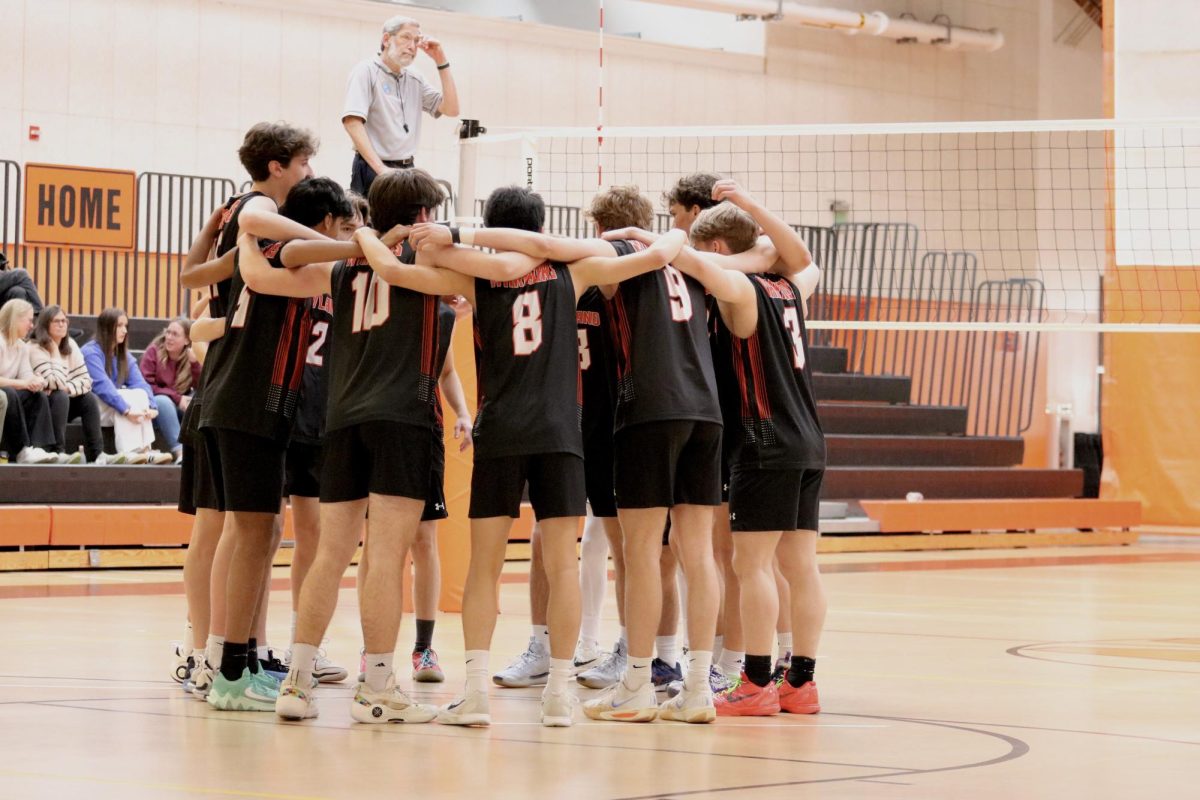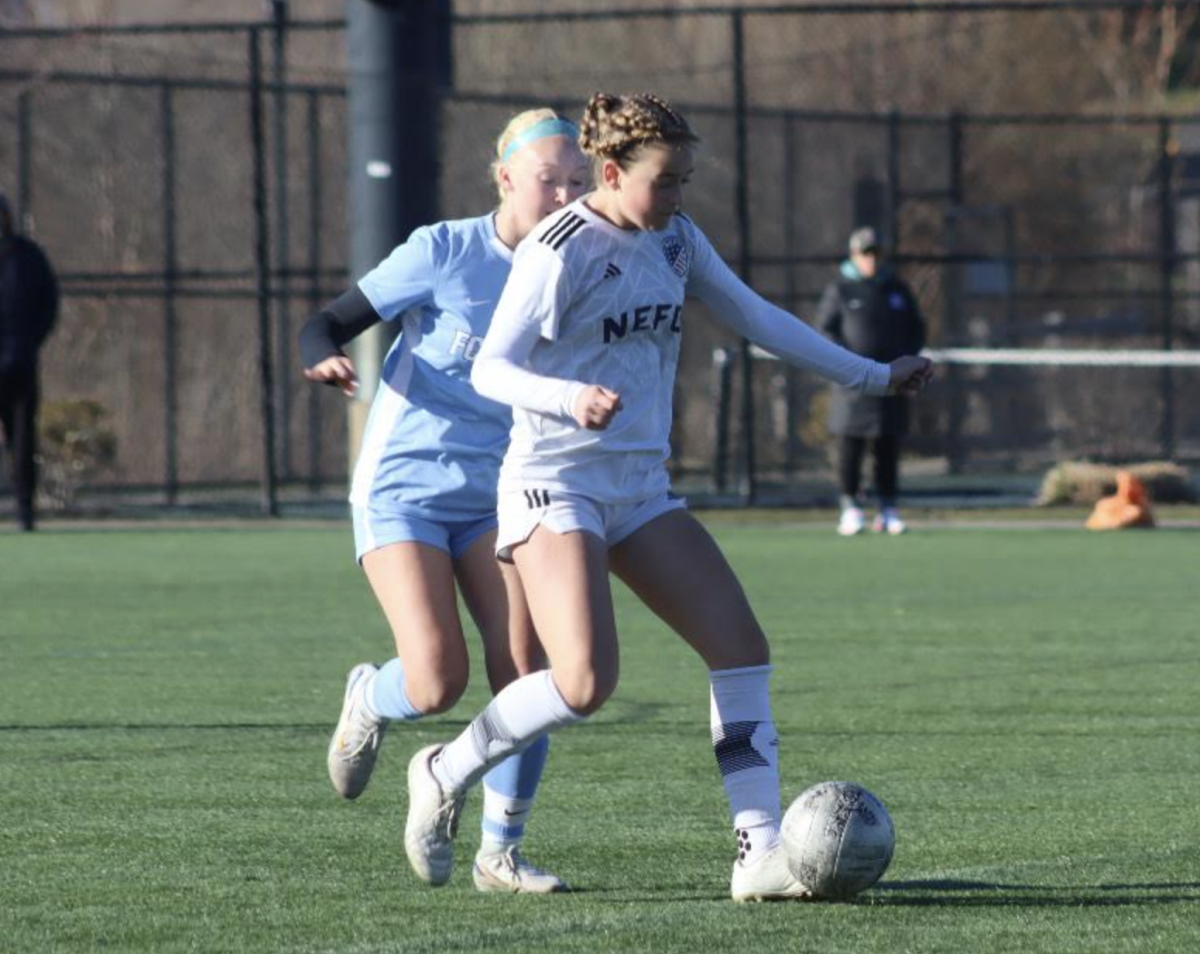According to Wayland athletics assistant Erin Ryan, roughly 70% of students participate in at least one season of sports at Wayland High School (WHS). For some student-athletes, being an athlete isn’t a title that they want to give up once they go off to college.
While at WHS, Class of 2024 alum Ava Balukonis competed for the Wayland-Weston crew team and swam for the black and orange. Today, she wears Carolina blue as a member of the University of North Carolina at Chapel Hill’s (UNC) rowing team. UNC is a National Collegiate Athletic Association Division I school.
“It’s definitely hard,” Balukonis said. “But definitely worth it.”
The opportunity to play any sport in college is something very few people get the chance to do. Only about 6% of high school athletes go on to play in college.
WHS Class of 2023 alum Deirdre Brown is currently a NCAA Division I lacrosse player at American University in Washington, DC.
“Once you get to college, even if you were the best player on your high school team, everyone’s the best player on their high school team,” Brown said. “It’s a whole other level that you have to reach once you actually get to school here.”
WHS Class of 2023 alum Derek Roberts, a left-handed pitcher who received all-conference recognition at WHS during his junior year, earned a spot on the roster at Endicott College, one of the best NCAA Division III baseball teams in the country.
“I spent a bunch of years going through recruiting camps and everything so I got a good deal of what college sports were gonna be like,” Roberts said. “It’s a lot more than I thought it was going to be, though.”
Each student-athlete mentioned the same three themes about playing at the collegiate level. According to the athletes, to be successful in college sports, you must manage your time, make sacrifices and love what you’re doing.
The day-to-day life of these athletes can vary depending on the time of year. For in-season athletes, they can expect 20 hours of their week dedicated to their sport, and eight hours a week during the offseason. For Balukonis, rowing at UNC means early wake up calls and many hours on the water.
According to Balukonis, she wakes up at 5:30 a.m. every day for a two hour rowing practice on the lake. Three days a week, these practices are followed with a bus ride to the gym where they lift and workout. The other two days the morning practices are followed with class, and then a two hour erg practice–which is practice with the rowing machines.
According to Brown, the busy schedule of a college athlete is something she enjoys.
“There gets to a point when you feel like you’re living the same day every day, which you kind of get used to,” Brown said. “I kind of got used to that grind, which is what I wanted from a D1 school.”
College athletes are also full-time students who have to manage their time around their busy sports days and schoolwork. According to Roberts, Endicott prioritizes being a student first, then an athlete.
“I feel like one of the biggest adjustments I had to make was knowing how to balance my student schedule, my baseball schedule and my social schedule,” Roberts said. “We have a bunch of situations [at Endicott] where if you’re not up to standards on your academics, then you’re not allowed to participate in certain events.”
Some schools offer resources to help them thrive academically. According to Balukonis, at UNC, freshmen have scheduled study hall hours that they have to attend each week.
“The student-athlete study area is nice to have all of the freshman athletes have to go there for four hours a week,” Balukonis said. “It honestly helps me to have those scheduled hours in our study rooms just because it forces me to do my work.”
These players would not be in their situation today if not for their love of their sport, and their willingness to make sacrifices. According to Brown, becoming a college athlete requires a major time commitment. Spectators see their extraordinary performances on the field, court or on the water, but don’t see the countless hours spent perfecting their craft behind closed doors.
“The sacrifices are the extra hours that you put in,” Brown said. “Maybe you miss hanging out with your friends or you miss even school days to go to a recruiting tournament or a school visit. It’s a bunch of sacrifices in that sense.”
College athletes spend almost 60 hours a week doing sports and schoolwork, yet they wouldn’t be doing it if they thought it was a waste of time. They love the game that they play.
“I get to meet a bunch of really good guys, I get to stay in really good shape and I get to play a sport that I love,” Roberts said. “I think that for some people it’s not worth it, but for me, I love the game of baseball and I think it’s worth it.”





![Last Wednesday, the Wayland School Committee gathered to discuss a number of topics regarding the health curriculum and Innovation Career Pathway course. Another large topic of conversation was the ways to potentially mitigate distracting cell phone usage. "These [phones] are going to distract your learning and social relationships," Superintendent David Fleishman said. "That's concrete right there."](https://waylandstudentpress.com/wp-content/uploads/2025/06/Screenshot-2025-06-04-at-9.49.31 PM-1200x886.png)



























Caitlin Fink • Feb 9, 2025 at 8:53 PM
Great article!
Terry Williams • Feb 9, 2025 at 12:32 PM
great write up Joey…..very well done!!